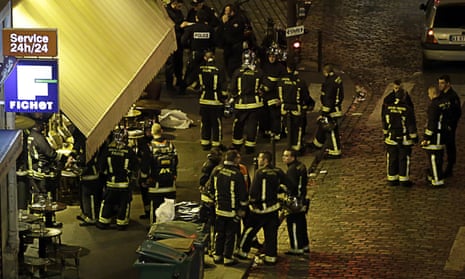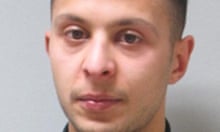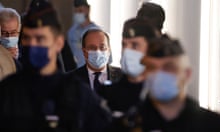The sole survivor of the jihadist cell alleged to have killed 130 people in Paris six years ago has told his trial the attacks were revenge for French airstrikes in Syria and Iraq, and that France had known “the risks” of attacking Islamic State.
“We fought France, we attacked France, we targeted the civilian population – but it was nothing personal against them,” Salah Abdeslam said of the coordinated gun and suicide bomb attacks across Paris on 13 November 2015, which began at the national football stadium, continued at bars and restaurants and ended with a massacre inside a rock gig at the Bataclan concert hall.
“I know my statement may be shocking, but it is not to dig the knife deeper in the wound but to be sincere towards those who are suffering immeasurable grief,” he told the court.
Abdeslam is the only survivor of the group of 10 people who allegedly attacked the French capital with machine guns and suicide bombs in the deadliest violence against the country since the second world war. The other attackers blew themselves up or were shot by police.
In court, Abdeslam spoke of the socialist ex-president François Hollande, who had authorised strikes against IS targets in Syria. “François Hollande knew the risks he was taking in attacking the Islamic State in Syria,” he said, adding that the president knew that “in taking that decision, French people would die”.
Many at the court hearing, including families of the dead and the roughly 350 people physically injured, cried or hugged one another as Abdeslam spoke on Wednesday, on his 32nd birthday. The trial, which will last for nine months, is the biggest criminal trial in modern French legal history.
Abdeslam, who identified himself in court last week as a “fighter for the Islamic State”, insisted that he and his co-accused were not “terrorists, jihadists, extremists” but “Muslims”. “It’s about authentic Islam,” he said.
“They say often that I’m being provocative, but it’s not true, I want to be sincere,” he said. “My goal is not to hurt anyone.”
For six years Abdeslam, a Brussels-born French citizen accused of being central to the vast international logistics operation that allowed the jihadist commandos to return to Europe from Syria, had maintained a stubborn and almost total silence towards investigators.
But in the first days of court proceedings in Paris last week, he twice interrupted proceedings with outbursts. He said of several of his co-accused: “They helped me but they knew nothing at all.” At another point he said that he and his co-accused were being treated “like dogs” in prison.
Abdeslam is accused of having escorted the three bombers who blew themselves up at the Stade de France national stadium. He is suspected of planning to carry out his own suicide attack in Paris’s 18th arrondissement, and backing out. Police found a suicide vest they believe he intended to use in a rubbish bin. His brother blew himself up and died at a Paris bar during the attacks. Abdeslam is alleged to have hidden south of Paris after the attacks and called contacts in Brussels to collect him by car.
Four months later, he was arrested at a Brussels flat after a shootout with police. Days after his arrest, suicide bombers alleged to be part of the same cell struck at Brussels airport and metro, killing 32 people and injuring 270.
In total, 20 suspects are on trial accused of providing various levels of planning and logistical support in the Paris attacks. Six will be tried in their absence – five are presumed dead in Iraq or Syria and one is in prison in Turkey.
Also on trial is Mohamed Abrini, 36, Abdeslam’s childhood friend, believed to have travelled to the Paris region with the November attackers and who was later captured on CCTV with the two Brussels airport bombers. He is accused of taking part in financing and providing weapons for the Paris attacks.
In court, Abrini acknowledged taking part in terrorist attacks but said he was “neither the commander nor the architect”.









